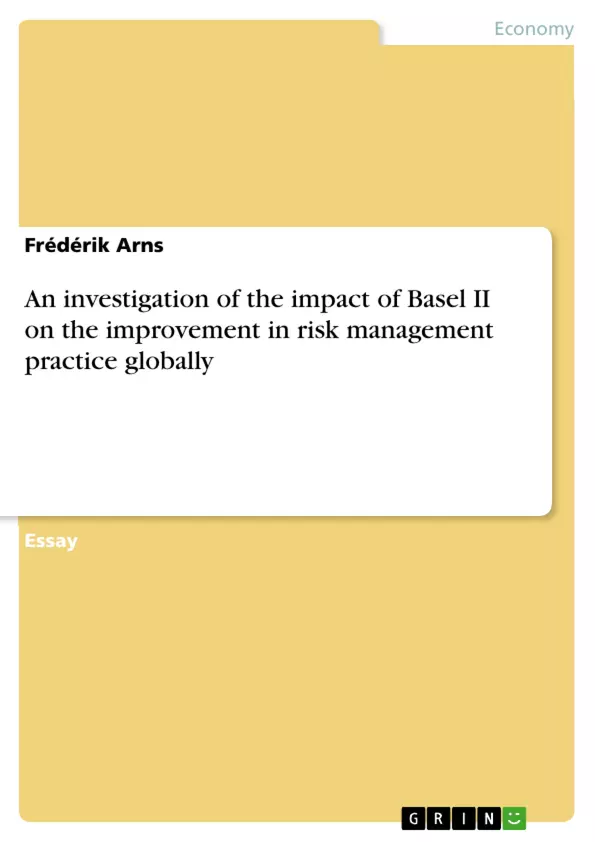The new Basel Accord will be introduced in 2007, this publication examines in how far the new package of regulations will benefit risk management globally. After evaluating contradictory points of view of several internationally active groups, the author comes to the conclusion that even though the final impact cannot yet be observed Basel II is likely to improve the current situation of risk management in the market.
Inhaltsverzeichnis (Table of Contents)
- Introduction
- The initial Accord: An Overview
- Basel II: the key points
- Capital Requirements: The approaches
- IRB-Approaches: The details
Zielsetzung und Themenschwerpunkte (Objectives and Key Themes)
This essay aims to analyze the impact of Basel II on risk management practices globally. It will explore the key aspects of Basel II in comparison to Basel I and critically evaluate the changes introduced by the new accord.
- The evolution of risk management regulations from Basel I to Basel II.
- The benefits and drawbacks of Basel II's new approach to risk management.
- The impact of Basel II on bank capital requirements and credit risk management.
- The role of internal ratings-based (IRB) approaches in Basel II.
- The potential implications of Basel II for financial stability and risk management.
Zusammenfassung der Kapitel (Chapter Summaries)
- Introduction: The essay outlines its purpose, which is to analyze the impact of Basel II on risk management practices globally. It explains that the essay will compare Basel II to Basel I and critically evaluate the changes introduced.
- The initial Accord: An Overview: This section provides a brief overview of Basel I, which was adopted in 1988. It discusses the accord's main objectives, its capital reserve requirement, and its limitations.
- Basel II: the key points: This section discusses the main objectives of Basel II, including improving risk-sensitivity in banks' capital allocation, calculating detached capital charges for operational and credit risk, and bringing regulatory capital requirements closer to banks' economic capital requirements. It also highlights the three pillars of the Basel II framework: minimum capital requirements, supervisory review, and market discipline.
- Capital Requirements: The approaches: This section explains the two main approaches to determine capital requirements and credit risks under Basel II: the standardized approach and the internal ratings-based (IRB) approach. It provides a brief overview of the risk weights under the standardized approach and discusses the different types of IRB approaches, including the foundation IRB approach and the advanced IRB approach.
- IRB-Approaches: The details: This section delves deeper into the IRB approaches, explaining how banks can determine the probability of default (PD) and the amount of loss (LGD) using their internal models. It discusses the different factors involved in the calculation of capital requirements under the IRB approaches, including the effective remaining life (M) and the exposure at default (EAD).
Schlüsselwörter (Keywords)
The main keywords and focus topics of the text include: Basel II, Basel I, risk management, capital requirements, credit risk, operational risk, internal ratings-based (IRB) approaches, standardized approach, probability of default (PD), loss given default (LGD), regulatory capital, economic capital, supervisory review, market discipline, financial stability, risk assessment.
Frequently Asked Questions
What is the main difference between Basel I and Basel II?
Basel II introduced higher risk-sensitivity, detached capital charges for operational risk, and the "three pillars" framework, whereas Basel I was more simplistic.
What are the three pillars of Basel II?
The three pillars are: 1. Minimum Capital Requirements, 2. Supervisory Review Process, and 3. Market Discipline (Disclosure).
What is the Internal Ratings-Based (IRB) approach?
The IRB approach allows banks to use their own internal models to estimate credit risk factors like Probability of Default (PD) and Loss Given Default (LGD) to determine capital requirements.
How does Basel II benefit global risk management?
It brings regulatory capital requirements closer to the actual economic risks banks face, encouraging more sophisticated risk assessment and stability.
What is the Standardized Approach in Basel II?
It is a simpler method where banks use external credit assessments (like ratings from S&P or Moody's) to determine the risk weights of their assets.
- Quote paper
- Frédérik Arns (Author), 2006, An investigation of the impact of Basel II on the improvement in risk management practice globally, Munich, GRIN Verlag, https://www.grin.com/document/52790



